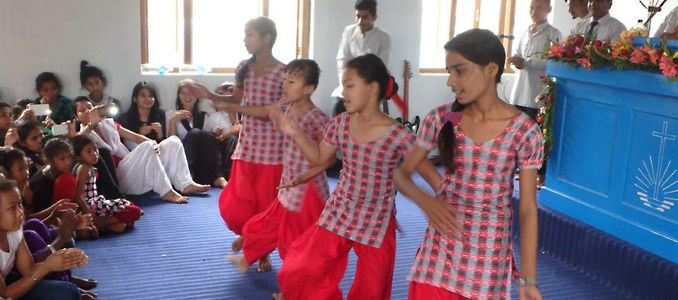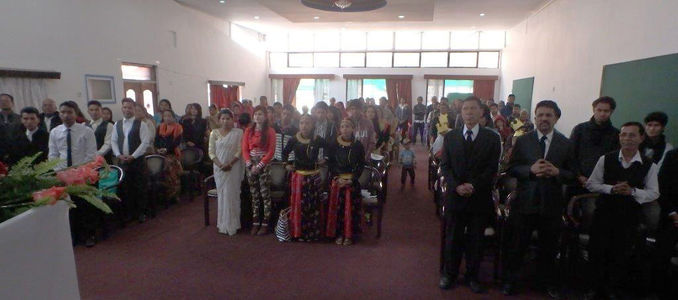
The New Apostolic Church in Nepal just celebrated its twenty-fifth anniversary—although our faith has been known there longer. The official celebrations took place a year after the fact. There were good reasons for both of these exceptions.
Nepal is one of the poorest countries in the world. Nearly 40 per cent of the people there live below the poverty line. But the overall situation has improved since the country has begun with political and economic reforms.
In 1990, for example, there was a constitutional reform that made the first democratic elections possible. The New Apostolic Church dates the founding of the Church in Nepal in the same year. But the faith and creed of the New Apostolic Church were brought to the country already in 1982 through the later Apostle Herald K. K. Jacob from India. His first trip across the border by train took him from his home city of Kolkata in India to the region of Jeetpur.
Religious freedom opens new possibilities
Missionary work and congregational life took place quietly, because the state religion in Nepal was Hinduism. The constitution specifically denied converting a person to another religion, say Christianity. This did not change with the new constitution that came in effect in 1990, but the article forbidding the conversion was no longer enforced.
Nepal declared itself a secular state in 2006 and introduced the freedom of religion, enshrining it in its constitution. This opened new possibilities for the New Apostolic Church, for example, the right to buy property. Thanks to this the first New Apostolic could be built in Nepal. It was completed in 2009.
Church construction with obstacles
The construction of our church in the mountain village of Sipapokhare and its dedication show how difficult life can be for the people in Nepal. The work on the church took around nine months to complete. Most of the building materials had to be brought in over rough and steep roadways from the capital of Kathmandu—trips lasting up to four hours.
A few days before the planned dedication by District Apostle Leslie Latorcai—he was responsible at the time—some brothers made a trip to inspect the building. When they got close to the village they found out that a temporary bridge crossing two sections of a major river had been removed. On the day of the dedication, then, the leading ministers from Canada had to walk across a 300-foot suspension bridge, while the vehicles were driven across the river.
Birthday celebration with all the congregations
Today Sipapokhare is the central congregation in the eastern part of Nepal. There are a total of 13 congregations in this state along the Himalayas and just on a thousand members. The New Apostolic Church Canada sees to the members’ pastoral care as well as administrative matters, and District Apostle Helper Frank Dzur is responsible.
A reconstruction programme is currently underway in Sipapokhare. A devastating earthquake of 7.8 magnitude struck the region last year in April, which was followed by a number of similarly severe aftershocks. Among the international organizations involved with the reconstruction process there are also New Apostolic organizations: NAK-karitativ and the Missionswerk (both from Germany), NAK-Humanitas from Switzerland, and the aid organizations of the New Apostolic Churches in Canada and USA.
On account of the earthquake last year—the year of the official jubilee—the celebrations had to be postponed. District Apostle Mark Woll rescheduled his visit for 2016. As part of the celebrations there was a divine service for ministers and their wives in our damaged church in Kathmandu, as well as central services for the brothers and sisters from the highlands in Kathmandu and for the members from the southern part of the country in Jeetpur. In this way all congregations in the country were able to take part in the belated birthday celebrations of their Church.




















